
Vancouver Hosts Return to In-person Meetings
VANCOUVER, Canada — At the first in-person meetings of NERC’s Board of Trustees and Member Representatives Committee (MRC) since the start of the COVID-19 pandemic, attendees reflected on the changes that the organization has experienced in the years since they last saw each other.
“I think the last time we met in person, Jennifer Sterling was the chair, and then Paul [Choudhury] took over as chair … and now I’ve taken over,” MRC Chair Roy Jones said on Wednesday. “So Paul now has the honor of being the only MRC chair to never hold a meeting in person.”
The meetings, held Wednesday and Thursday, were NERC’s second attempt at returning to in-person gatherings after the second-quarter meetings, intended to be held in D.C., were converted to virtual sessions after an attendee tested positive for COVID-19 at the meeting site. (See “Positive COVID-19 Test Prompts Return to Virtual Sessions,” NERC Board of Trustees/MRC Briefs: May 11-12, 2022.)
Ahead of the third-quarter meetings, NERC put new policies in place to prevent a repeat of the incident and its disruptions to attendees’ travel plans. These rules, requiring isolation and virtual attendance after a positive test, were put into practice when NERC CEO Jim Robb tested positive on-site the day before the MRC meeting. While Robb remained in Vancouver and listened to the events via webcast, Manny Cancel, president of the Electricity Information Sharing and Analysis Center, delivered the President’s Report in his place.
The final meeting of the board and MRC in 2022 is scheduled for Nov. 15-16 in New Orleans. According to the 2023 schedule shared this week, NERC plans to hold its first- and third-quarter meetings in person in California and Canada, respectively. Gatherings for the second and fourth quarter will be held in D.C. and Atlanta, following a hybrid model in which trustees and members meet in person while all other attendees join virtually.
Board Approves ERO Budgets
The board approved relatively few actions at its meeting Thursday. Only the Finance and Audit Committee (FAC) submitted any items for approval, primarily the final business plans and budgets for NERC and the regional entities, approved at its meeting the day before. (See related story, NERC FAC Approves Final 2023 ERO Budgets.) With the board’s approval, the ERO will file the budgets with FERC by Aug. 25.
Board Chair Ken DeFontes and Trustee Roy Thilly talk at the board meeting in Vancouver. | © RTO Insider LLC
The FAC also asked trustees to approve an extension of NERC’s $4 million line of credit, which the organization maintains for emergency working capital needs and unforeseen contingencies. NERC has renewed the line annually since 2007; last year the board authorized management to execute the renewal without its approval.
However, the board must still give its assent “if the terms and conditions [of the line of credit] materially change.” In the next renewal period, the interest rate index for the line will change from the London Interbank Offered Rate to the Secure Overnight Financing Rate, which qualifies as a material change. As a result, management decided to take the question of approval back to the FAC and board. The trustees agreed to the change and renewal without objection.
Updates on Standards Projects
Howard Gugel, NERC’s vice president of engineering and standards, updated the board on the progress of some ongoing standards projects. First was Project 2021-07 (Extreme cold weather grid operations, preparedness and coordination), which NERC started last year in response to the mass outages caused by the February 2021 winter storm.
The project has produced two draft standards, EOP-011-3 (Emergency operations) and EOP-012-1 (Extreme cold weather preparedness and operations). Both standards were posted for comment in May; EOP-011-3 passed on the first ballot, but EOP-012-1 failed and was returned to the standard drafting team for revision along with industry comment. Gugel said EOP-011-3 is currently “in a holding pattern until we get EOP-012 across the board.”
Gugel also discussed the ongoing efforts to revise NERC’s Critical Infrastructure Protection (CIP) standards, including the proposed changes to CIP-003-8 (Cybersecurity — security management controls) that are currently out for a formal comment and ballot period that will close on Friday. If the standard passes this ballot — for which Gugel said NERC has “good expectations” — additional revisions are likely to follow based on the work of Project 2016-02 (Modifications to CIP standards), which on Wednesday entered a ballot period that is expected to wrap up by Sept. 21.




